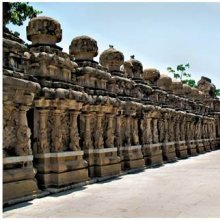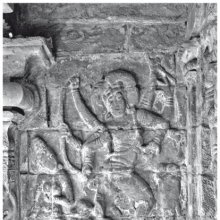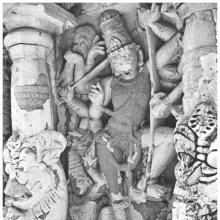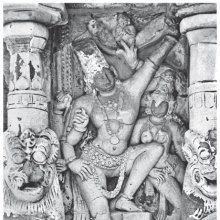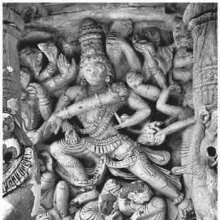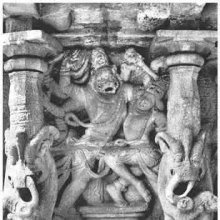Mura: 20 definitions
Introduction:
Mura means something in Hinduism, Sanskrit, the history of ancient India, Marathi, Jainism, Prakrit, biology. If you want to know the exact meaning, history, etymology or English translation of this term then check out the descriptions on this page. Add your comment or reference to a book if you want to contribute to this summary article.
Images (photo gallery)
(+65 more images available)
In Hinduism
Purana and Itihasa (epic history)
Source: Google Books: The Purana IndexMura (मुर):—An Asura of five heads; got up from sleep under waters on hearing the sound of Pāñcajanya: His head was cut off by Kṛṣṇa. His seven sons rose with Pīṭha, their commander, and were put to death by Garuḍa in charge of the outskirts of the city of Prāgjyotiṣa; father of 7000 sons.
Source: archive.org: Puranic Encyclopedia1) Mura (मुर).—A ferocious asura. Birth and acquisition of boons. Mura was the asura born to Kaśyapaprajāpati of his wife Danu. Once Mura was shocked to find the huge heap of dead bodies of the asuras killed by the devas. Mura got afraid of death and did penance for years to propitiate his grandfather and Brahmā appeared before him and asked him to name the boon he wanted. Mura said "Lord, anybody whom I touch with my hands in a battle, even if they are immortal, should die." Brahmā the father of the universe granted him the boon. (Chapter 60, Vāmana Purāṇa). (See full article at Story of Mura from the Puranic encyclopaedia by Vettam Mani)
2) Mura (मुर).—Son of Tālajaṅgha, an asura born of a part of Brahmā. The capital of this valorous Murāsura was in the city of Candravatī.
2) Murāsura who possessed the brilliance of Brahmā was a nightmare to the devas. Once Murāsura fought against Viṣṇu and in the fierce fight that took place Viṣṇu was defeated and he ran away from the battlefield and started sleeping in a cave named Siṃhavatī in the neighbourhood of Badarikāśrama. Mura went there too. Then Mahāviṣṇu created a Devī through his Yogamāyā and made her kill Mura. Pleased at the slaughter of Mura, Viṣṇu blessed her and said "From today onwards you will be known as 'Ekādaśī'. You will be capable of wiping off all sins on earth." (Padmapurāṇa, Uttarakhaṇḍa 36. 50-80).
3) Mura (मुर).—(muru) A Yādava King. He was one of the neighbours of Jarāsandha. The daughter of this Yādava king called Kāmakaṭaṅkaṭā was married to Ghaṭotkaca. (13. 13. Sabhā Parva and Skanda Purāṇa).
4) Mura (मुर).—(muru) A country of ancient Bhārata. A King called Bhagadatta was the King of this country. (Śloka 14, Chapter 14, Sabhā Parva).
Source: Cologne Digital Sanskrit Dictionaries: The Purana IndexMura (मुर).—An Asura of five heads; got up from sleep under waters on hearing the sound of Pāñcajanya (s.v): His head was cut off by Kṛṣṇa. His seven sons rose with Pīṭha, their commander, and were put to death by Garuḍa in charge of the outskirts of the city of Prāgjyotiṣa; father of 7000 sons.*
- * Bhāgavata-purāṇa X. 59. 6-19; 37. 16; III. 3. 11; IV. 26. 24; Viṣṇu-purāṇa V. 29. 17-18.
Mura (मुर) is a name mentioned in the Mahābhārata (cf. II.13.13, VIII.4.52) and represents one of the many proper names used for people and places. Note: The Mahābhārata (mentioning Mura) is a Sanskrit epic poem consisting of 100,000 ślokas (metrical verses) and is over 2000 years old.

The Purana (पुराण, purāṇas) refers to Sanskrit literature preserving ancient India’s vast cultural history, including historical legends, religious ceremonies, various arts and sciences. The eighteen mahapuranas total over 400,000 shlokas (metrical couplets) and date to at least several centuries BCE.
Ayurveda (science of life)
Agriculture (Krishi) and Vrikshayurveda (study of Plant life)
Source: Shodhganga: Drumavichitrikarnam—Plant mutagenesis in ancient IndiaMurā (मुरा) (identified with Erythrina stricta) is used in various bio-organical recipes for plant mutagenesis such as manipulating the scent of flowers, according to the Vṛkṣāyurveda by Sūrapāla (1000 CE): an encyclopedic work dealing with the study of trees and the principles of ancient Indian agriculture.—Accordingly, “Fragrance of the blossom can be changed by filling (the base near) the roots (pūrṇa-mūla) of the trees with the earth scented with the desired fragrance and then fed with water mixed with Cyperus rotundus, Erythrina stricta [e.g., Murā], Valeriana wallichii, Aporosa lindleyana and Cinnamomum tamala”.

Āyurveda (आयुर्वेद, ayurveda) is a branch of Indian science dealing with medicine, herbalism, taxology, anatomy, surgery, alchemy and related topics. Traditional practice of Āyurveda in ancient India dates back to at least the first millenium BC. Literature is commonly written in Sanskrit using various poetic metres.
India history and geography
Source: Cologne Digital Sanskrit Dictionaries: Indian Epigraphical GlossaryMurā.—(EI 33), a measure of capacity; cf. muraka. Note: murā is defined in the “Indian epigraphical glossary” as it can be found on ancient inscriptions commonly written in Sanskrit, Prakrit or Dravidian languages.

The history of India traces the identification of countries, villages, towns and other regions of India, as well as mythology, zoology, royal dynasties, rulers, tribes, local festivities and traditions and regional languages. Ancient India enjoyed religious freedom and encourages the path of Dharma, a concept common to Buddhism, Hinduism, and Jainism.
Biology (plants and animals)
Source: Google Books: CRC World Dictionary (Regional names)1) Mur in India is the name of a plant defined with Commiphora molmol in various botanical sources. This page contains potential references in Ayurveda, modern medicine, and other folk traditions or local practices It has the synonym Commiphora molmol Engl. ex Tschirch (among others).
2) Mur is also identified with Commiphora myrrha It has the synonym Commiphora myrrha var. molmol Engl. (etc.).
3) Mur in Senegal is also identified with Oncoba spinosa.
Example references for further research on medicinal uses or toxicity (see latin names for full list):
· Ann. Ist. Bot. Roma (1897)
· Bull. Soc. Roy. Bot. Belg. (1953)
· Parasitology International (2009)
· Trans. Roy. Soc. S. Afr. (1916)
· Journal of Ethnopharmacology (1991)
· Handb. Pharmakogn.
If you are looking for specific details regarding Mur, for example extract dosage, diet and recipes, side effects, health benefits, pregnancy safety, chemical composition, have a look at these references.

This sections includes definitions from the five kingdoms of living things: Animals, Plants, Fungi, Protists and Monera. It will include both the official binomial nomenclature (scientific names usually in Latin) as well as regional spellings and variants.
Languages of India and abroad
Marathi-English dictionary
Source: DDSA: The Molesworth Marathi and English Dictionarymurā (मुरा) [or मुरामासा, murāmāsā].—m The name of a freshwater-fish.
--- OR ---
mūra (मूर).—f (muraṇēṃ) A concealed vent; any transuding or oozing place (as through a dam or an embankment) for water. 2 Looseness of consistence in a soil or a substance; facility of transmission or absortion of water; permeableness, porousness. 3 Oozing, exuding. 4 Wastage, loss by leakage, dryage, spillage, or wastage of any form. 5 Sediment (i. e. wastage or loss) in preparing or in reheating clarified butter. 6 Loss (sinking of money) in trade or business. v yē. Ex. hyā rōjagārānta mūra ālī. 7 (Power of swallowing up or absorbing.) Room, capacity of containing. Ex. hyā kaṇagīnta khaṇḍībhara dhānyācī mūra āhē. 8 (In wood or stone.) Crack, softness, dryness, or other flaw.
--- OR ---
mūra (मूर).—n W Dew.
Source: DDSA: The Aryabhusan school dictionary, Marathi-Englishmūra (मूर).—f A concealed vent. Oozing. Po- rousness. Loss. n Dew.
Marathi is an Indo-European language having over 70 million native speakers people in (predominantly) Maharashtra India. Marathi, like many other Indo-Aryan languages, evolved from early forms of Prakrit, which itself is a subset of Sanskrit, one of the most ancient languages of the world.
Sanskrit dictionary
Source: DDSA: The practical Sanskrit-English dictionaryMura (मुर).—Encompassing, surrounding.
Derivable forms: muram (मुरम्).
--- OR ---
Mura (मुर).—Name of a demon slain by Kṛṣṇa; पार्थेनाथ द्विषन्मुरम् (pārthenātha dviṣanmuram) Śiśupālavadha 2.1.
-rā Name of a fragrant plant.
-ram Encompassing, surrounding.
Derivable forms: muraḥ (मुरः).
--- OR ---
Mūra (मूर).—a. Ved.
1) Stupefied, bewildered.
2) Foolish, silly, stupid.
3) Destroying, killing.
Source: Cologne Digital Sanskrit Dictionaries: Shabda-Sagara Sanskrit-English DictionaryMura (मुर).—m.
(-raḥ) The name of a Daitya killed by Vishnu. f.
(-rā) table perfume. n.
(-raṃ) Surrounding, encircling. E. mura to encircle, aff. ka, or aṅ and ṭāp fem. aff.
Source: Cologne Digital Sanskrit Dictionaries: Benfey Sanskrit-English DictionaryMura (मुर).—m. The name of a Daitya killed by Viṣṇu.
Source: Cologne Digital Sanskrit Dictionaries: Cappeller Sanskrit-English DictionaryMura (मुर).—[masculine] [Name] of a demon slain by Kṛṣṇa.
--- OR ---
Mūra (मूर).—1. [adjective] stupid, dull.
--- OR ---
Mūra (मूर).—2. [adjective] rushing, impetuous.
--- OR ---
Mūra (मूर).—3. [neuter] = mūla.
Source: Cologne Digital Sanskrit Dictionaries: Monier-Williams Sanskrit-English Dictionary1) Mura (मुर):—[from mur] 1. mura n. encompassing, surrounding, [cf. Lexicographers, esp. such as amarasiṃha, halāyudha, hemacandra, etc.]
2) Murā (मुरा):—[from mura > mur] a f. See 2. mura.
3) Mura (मुर):—[from mur] 2. mura m. Name of a Daitya slain by Kṛṣṇa, [Mahābhārata; Harivaṃśa; Bhāgavata-purāṇa] (cf. muru)
4) Murā (मुरा):—[from mura > mur] b f. a species of fragrant plant (named after the Daitya), [Bhāvaprakāśa]
5) [v.s. ...] said to be the Name of the wife of Nanda and mother of Candragupta, [Viṣṇu-purāṇa]
6) Mura (मुर):—[from mur] n. See under 1, mura.
7) Mūra (मूर):—1. mūra mf(ā)n. (either = mūḍha or [from] √mṝ) dull, stupid, foolish, [Ṛg-veda; Pañcaviṃśa-brāhmaṇa]
8) 2. mūra mfn. ([from] √1. mū = mīv) rushing, impetuous (said of Indra’s horses), [Ṛg-veda iii 43, 6] ([Sāyaṇa] = māraka).
9) 3. mūra n. ([probably] also [from] √1. mū and meaning ‘something firm and fixed’ cf. [Kāśikā-vṛtti on Pāṇini 8-2, 18]) = mūla, a root, [Atharva-veda i, 28, 3.]
Source: Cologne Digital Sanskrit Dictionaries: Yates Sanskrit-English DictionaryMura (मुर):—(raḥ) 1. m. A demon killed by Vishnu. f. (rā) A vegetable perfume. n. Surrounding, encircling.
Source: DDSA: Paia-sadda-mahannavo; a comprehensive Prakrit Hindi dictionary (S)Mura (मुर) in the Sanskrit language is related to the Prakrit word: Mura.
[Sanskrit to German]
Sanskrit, also spelled संस्कृतम् (saṃskṛtam), is an ancient language of India commonly seen as the grandmother of the Indo-European language family (even English!). Closely allied with Prakrit and Pali, Sanskrit is more exhaustive in both grammar and terms and has the most extensive collection of literature in the world, greatly surpassing its sister-languages Greek and Latin.
Prakrit-English dictionary
Source: DDSA: Paia-sadda-mahannavo; a comprehensive Prakrit Hindi dictionary1) Mura (मुर) in the Prakrit language is related to the Sanskrit word: Laḍ.
2) Mura (मुर) also relates to the Sanskrit word: Sphuṭ.
3) Mura (मुर) also relates to the Sanskrit word: Mura.
4) Mūra (मूर) also relates to the Sanskrit word: Bhañj.
Prakrit is an ancient language closely associated with both Pali and Sanskrit. Jain literature is often composed in this language or sub-dialects, such as the Agamas and their commentaries which are written in Ardhamagadhi and Maharashtri Prakrit. The earliest extant texts can be dated to as early as the 4th century BCE although core portions might be older.
Kannada-English dictionary
Source: Alar: Kannada-English corpusMura (ಮುರ):—
1) [noun] a bent or curving part.
2) [noun] that which is bent.
3) [noun] the quality or fact of being crooked or askew; crookedness.
4) [noun] water in swift, violent, circular motion, as produced by the meeting of opposing currents, often causing a downward spiraling action that draws floating objects deep under the surface; a whirlpool.
5) [noun] a kind of ear ornament.
6) [noun] the act of going of withdrawing back; withdrawal in the face of opposition or from a dangerous situation; a retreat.
7) [noun] the act of enclosing from all sides; an encircling.
8) [noun] a structure consisting of something wound in a continuous series of loops.
9) [noun] a going out of sight; disappearance.
10) [noun] fluctuation, instability or oscillation (of the mind).
11) [noun] a thin line joining two points on the same plain.
12) [noun] a flowing (of a liquid, light, etc.) in a stream.
13) [noun] a kind of ornament for the wrist.
14) [noun] an iron rim or circular band used in a sugarcane crushing machine (to keep the pair of rollers together).
15) [noun] a revolving around one point or moving in a circle, while fighting in a physical combat.
--- OR ---
Mura (ಮುರ):—[noun] a cattle feed made by mixing horsegram, cotton seeds, oil-cake, bran, etc. with water or kitchen waste.
--- OR ---
Mura (ಮುರ):—
1) [noun] a kind of plant.
2) [noun] a fragrnt substance obtained from this plant.
--- OR ---
Mūra (ಮೂರ):—[noun] the external covering of the woody stems, branches of plants, that is separable from the wood easily; the bark.
Kannada is a Dravidian language (as opposed to the Indo-European language family) mainly spoken in the southwestern region of India.
See also (Relevant definitions)
Starts with (+261): Mura-amure, Mura-awuda-rajakariya, Mura-awudaya, Mura-palleru, Mura-saki-mukashi-yomogi, Muraa, Muraagwa, Murabamungu, Murabat-baitti, Murabatte, Murabba, Murabbi, Murabhid, Muracai, Muracaketanan, Muracaketu, Muracakkotiyon, Muracal, Muracam, Muracamga.
Ends with (+25): Amura, Apramura, Atmura, Bhale-timura, Camura, Caramura, Chimura, Churmura, Cimura, Curamura, Gandila bamura, Hanuman mura, Hanumanmura, Haymura, Jhuramura, Juramura, Kamimura, Kenmura, Kolmura, Kukulamurmura.
Full-text (+135): Mur, Muraripu, Murari, Murajit, Maurya, Murahan, Murabhid, Muradvish, Muradeva, Muramardana, Murada, Amura, Rojamara, Utkhala, Talakhya, Muravairin, Gandhamalini, Murarimishriya, Madhumuranarakavinashana, Muraganda.
Relevant text
Search found 51 books and stories containing Mura, Murā, Mūra, Mur; (plurals include: Muras, Murās, Mūras, Murs). You can also click to the full overview containing English textual excerpts. Below are direct links for the most relevant articles:
Rig Veda (translation and commentary) (by H. H. Wilson)
Puranic encyclopaedia (by Vettam Mani)
Hari-bhakti-kalpa-latikā (by Sarasvati Thkura)
Women in the Atharva-veda Samhita (by Pranab Jyoti Kalita)
30. Goddess Yātudhānī < [Chapter 4 - Female Deities and the Glorification of Women in the Atharvaveda]
Garga Samhita (English) (by Danavir Goswami)
Verse 4.8.11 < [Chapter 8 - In the Story of the Yajña-sītās, the Glories of Ekādaśī]
Verse 2.24.16 < [Chapter 24 - The Story of Asuri Muni in the Rāsa-dance Pastime]
Verse 8.13.48 < [Chapter 13 - A Thousand Names of Lord Balarāma]
Sahitya-kaumudi by Baladeva Vidyabhushana (by Gaurapada Dāsa)
Related products
